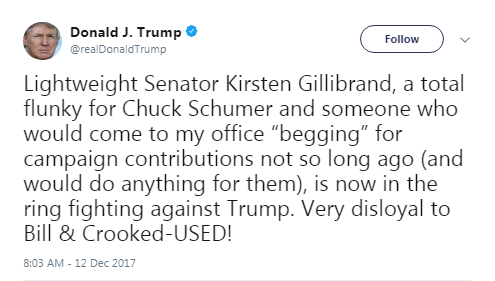Abortion rights, women of color, and LGBTQIA+ people are under attack. Pledge to join us in fighting for gender justice.
ICYMI, This Is What Workplace Sexual Harassment Looks Like

Lightweight Senator Kirsten Gillibrand, a total flunky for Chuck Schumer and someone who would come to my office “begging” for campaign contributions not so long ago (and would do anything for them), is now in the ring fighting against Trump. Very disloyal to Bill & Crooked-USED!
— Donald J. Trump (@realDonaldTrump) December 12, 2017
“[She] would come to my office “begging” for campaign contributions . . . and would do anything for them….”
ICYMI, this is what workplace sexual harassment looks like.
Let’s review: the President of the United States, arguably the most powerful person in the world, has just publicly intimated that a female Senator exchanged sexual favors for campaign contributions, all because she spoke out, joining four other male Senators in calling for Trump’s resignation over allegations of sexual misconduct.
Trump made the decision to denigrate and objectify an opponent in the most public forum possible, implying that she owes her success to sex, because she is a woman. It is an attempt to use Senator Gillibrand’s gender against her, to undermine her considerable hard work, education, political and personal success, and authority, by suggesting that none of it matters for women because, after all, all she had to do was get on her knees.
If this is not quintessential workplace sexual harassment, I don’t know what is.
Women in every industry—business, politics, media, tech, academia—must deal with men—coworkers, bosses, clients—who display this very attitude. It happens in conference rooms at meetings, or behind closed doors, and in the fields where it is most prevalent, women are pushed out. Sexual harassment is a way of reinforcing the power imbalances in our society, a way of exacting control over women who appear ‘too ambitious,’ or who call men out for unacceptable behavior.
You cannot silence me or the millions of women who have gotten off the sidelines to speak out about the unfitness and shame you have brought to the Oval Office. https://t.co/UbQZqubXZv
— Kirsten Gillibrand (@SenGillibrand) December 12, 2017
“I will not be silenced.”
Senator Gillibrand is brave for standing up, for refusing to back down, but she’s also brave because she can afford to be—she has access to resources, support, and the privilege of being educated, documented, white, and, of course, a Senator. Most women affected by workplace harassment do not have these privileges and speaking up could cost them their jobs, their healthcare, or even put families in danger if they are undocumented. Low-wage and undocumented workers, as well as trans and gender nonconforming folks are some of the most vulnerable groups to sexual harassment.
When will we decide as a society that sexual harassment is unacceptable behavior? It seems we are in the process of making that determination, but looking at the number of national leaders who remain willing to (at best) ignore and (at worst) vilify those who accuse powerful political figures of sexual harassment or assault, it appears we have a long way to go.




